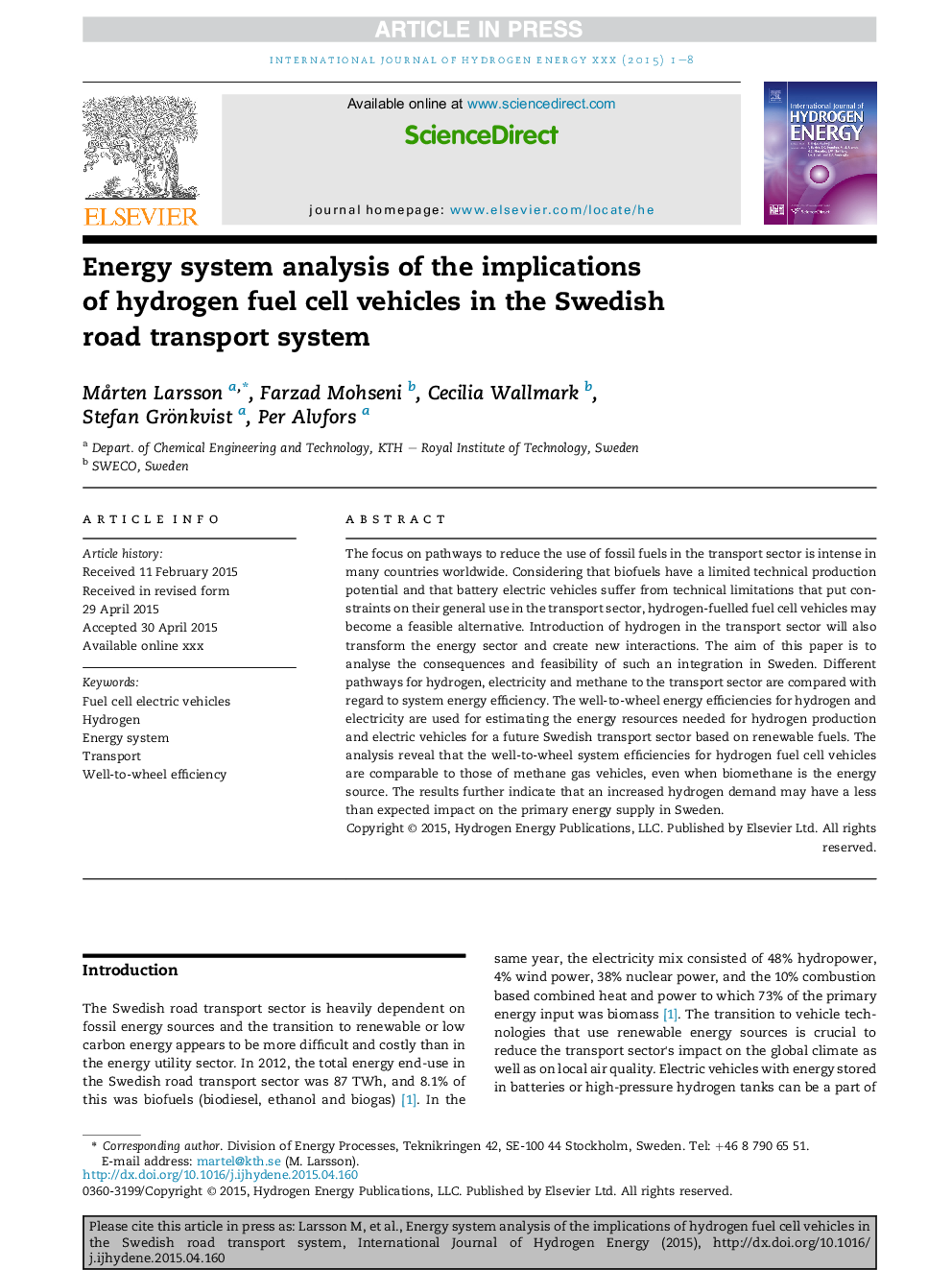| کد مقاله | کد نشریه | سال انتشار | مقاله انگلیسی | نسخه تمام متن |
|---|---|---|---|---|
| 7714245 | 1497438 | 2015 | 8 صفحه PDF | دانلود رایگان |
عنوان انگلیسی مقاله ISI
Energy system analysis of the implications of hydrogen fuel cell vehicles in the Swedish road transport system
ترجمه فارسی عنوان
تجزیه و تحلیل سیستم انرژی از پیامدهای وسایل نقلیه سوخت هیدروژن در سیستم حمل و نقل جاده سوئد
دانلود مقاله + سفارش ترجمه
دانلود مقاله ISI انگلیسی
رایگان برای ایرانیان
کلمات کلیدی
وسایل نقلیه الکتریکی سوخت، هیدروژن، سیستم انرژی، حمل و نقل، بهره وری خوب به چرخ،
ترجمه چکیده
تمرکز بر راه های کاهش استفاده از سوخت های فسیلی در بخش حمل و نقل در بسیاری از کشورها در سراسر جهان شدید است. با توجه به اینکه سوخت های زیستی دارای یک پتانسیل فنی فنی محدود هستند و خودروهای الکتریکی باتری از محدودیت های فنی رنج می برند که محدودیت های عمومی خود را در بخش حمل و نقل محدود می کنند، وسایل نقلیه سوخت های سوخت هیدروژن ممکن است یک جایگزین قابل قبول باشد. معرفی هیدروژن در بخش حمل و نقل همچنین بخش انرژی را در بر می گیرد و تعاملات جدیدی ایجاد می کند. هدف این مقاله بررسی عواقب و امکان پذیری چنین ادغامی در سوئد است. راه های مختلف برای هیدروژن، برق و متان به بخش حمل و نقل با توجه به بهره وری انرژی سیستم مقایسه می شود. راندمان انرژی بهینه برای هیدروژن و برق برای تخمین منابع انرژی مورد نیاز برای تولید هیدروژن و وسایل نقلیه الکتریکی برای یک بخش حمل و نقل آینده سوئد بر اساس سوخت های تجدید پذیر استفاده می شود. تجزیه و تحلیل نشان می دهد که کارایی سیستم به خوبی برای چرخ ها برای وسایل نقلیه سوخت های هیدروژن با وسایل نقلیه گاز متان قابل مقایسه است، حتی زمانی که زیست انرژی منبع انرژی است. نتایج بیشتر نشان می دهد که افزایش تقاضا برای هیدروژن ممکن است تأثیری کمتر از تأخیر در تامین انرژی اولیه در سوئد داشته باشد.
موضوعات مرتبط
مهندسی و علوم پایه
شیمی
الکتروشیمی
چکیده انگلیسی
The focus on pathways to reduce the use of fossil fuels in the transport sector is intense in many countries worldwide. Considering that biofuels have a limited technical production potential and that battery electric vehicles suffer from technical limitations that put constraints on their general use in the transport sector, hydrogen-fuelled fuel cell vehicles may become a feasible alternative. Introduction of hydrogen in the transport sector will also transform the energy sector and create new interactions. The aim of this paper is to analyse the consequences and feasibility of such an integration in Sweden. Different pathways for hydrogen, electricity and methane to the transport sector are compared with regard to system energy efficiency. The well-to-wheel energy efficiencies for hydrogen and electricity are used for estimating the energy resources needed for hydrogen production and electric vehicles for a future Swedish transport sector based on renewable fuels. The analysis reveal that the well-to-wheel system efficiencies for hydrogen fuel cell vehicles are comparable to those of methane gas vehicles, even when biomethane is the energy source. The results further indicate that an increased hydrogen demand may have a less than expected impact on the primary energy supply in Sweden.
ناشر
Database: Elsevier - ScienceDirect (ساینس دایرکت)
Journal: International Journal of Hydrogen Energy - Volume 40, Issue 35, 21 September 2015, Pages 11722-11729
Journal: International Journal of Hydrogen Energy - Volume 40, Issue 35, 21 September 2015, Pages 11722-11729
نویسندگان
MÃ¥rten Larsson, Farzad Mohseni, Cecilia Wallmark, Stefan Grönkvist, Per Alvfors,
